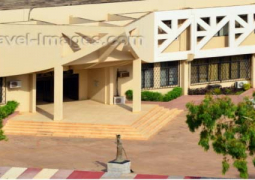The
launching of the Gambian National Think Tank by the Overseer of the Office of
the Vice-President Madam Fatoumata Jallow-Tambajang on behalf of the President
of the Republic of the Gambia is certainly
a welcome idea. This awaited institution has been hailed by many
Gambians at home and abroad as one that will play a pivotal role in taking the
Gambia forward. It embodies the vision of the President to tap into the rich
pool of the Gambian talents, expertise and experience for the development of
New Gambia. After many years of economic corruption, social decadence and
political uncertainty, the Think Tank has on its shoulders a big task in
transforming the Gambia into a country of socio-political stability and
economic progress in all domains. The experts of the Think Tank symbolise
socio-cultural intellectuals who are concerned about the reform of the Gambia
and should be able to contribute to the building of state institutions and
structures that will promote good governance and enhance the rights of citizens
and raise their ambitions. The new Think tank hopefully will not shy away from
engaging with plurality of ideas and ideologies. I believe that intellectual
plurality can develop a culture and a civilisation based on civility, the rule
of law, respect of human rights and the protection of minority rights. The
existence of intellectual diversity is antithesis to violent ideologies and
monopoly of ideas. Historically, the preponderance of a monoculture held Europe
back for many centuries (the so-called Dark Ages) until it reformed itself with
the emergence of the so-called Enlightenment. The European Enlightenment
encouraged critical engagement and the blossoming of science and philosophy.
This led to the creation of enlightened minds that freed themselves from
superstition and personality cults. The ideas and strategies developed by the
Think Tank will be expected to feed into the social, political, educational and
economic policies. It will be interesting how the Think Tank will develop
different policy documents and recommendations for The Government to implement.
The task before this community of experts is therefore daunting. With their
diverse backgrounds, one is hopeful though that they will be able to overcome
the huge tasks that lie ahead of them.
On
a critical note, we assume that change comes through technological, economic
and scientific/technical advancement. However, the most important drive and
catalyst of change is through hearts and minds. This comes by developing the
social sciences and humanities, in addition to the development of science in
its different fields. Talking of
humanities and social sciences, I particularly refer to educational sciences,
history, philosophy, politics, anthropology, sociology, theology and religious
studies. I do not know in detail the academic backgrounds of the Think Tank
Group, but I would assume the above areas will be covered in addition to the
“scientific” disciplines. I would also assume that the Think Tank will draw on
the expertise of theologians and social scientists especially that the country
is yearning for healing, transitional justice and reconciliation.
Finally,
I believe that intellectual plurality should not be a source of fear or threat.
Rather, it should be a source of strength and complementarity. It is also
believed that the Think Tank will be focussed on the supreme national interest
of the Gambia detached from narrow party lenses. The Gambia is at a crossroads
and the momentum for change must be maintained. Forward Ever and Backward
Never. May Allah bless the Gambia.
Author:
Dr Alhagi Manta Drammeh (PG CerTHE, FHEA, FRSA), is a Professor of Islamic
Studies & Contemporary World and Researcher at the Islamic Cultural Centre
in London


